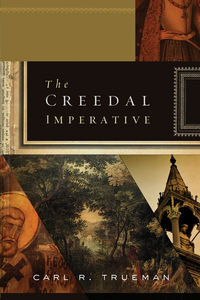posts
|
The Creedal Imperative is the latest work from Carl Trueman, professor of church history at Westminster Theological Seminary. This work is a timely one for evangelical churches as they seek to guard the good deposit of faith amid many changing and even opposing cultural currents.
A well-written, accessible, and concise work, the book contains six primary chapters. In chapter 1, the author raises the issue of how creeds and confessions are not highly valued especially in the free churches of the West where a "Bible alone" emphasis is often stated. Trueman adds that this anti-creedal perspective is due to a lack of value on the Christian past and confidence in the use of words to communicate Christian belief. Finally, he helpfully argues that ALL Christians have creeds and traditions. The difference is that confessional churches have public creeds, while many free churches have private unstated creeds--but they are creeds nonetheless. With that cultural environment in mind, in chapter 2, the author argues for a biblical basis for creeds (articulated Christian thought) and also the importance of the church as the place where creeds are reflected upon. For instance, he correctly cites Philippians 2:6-11 as a creedal passage in Paul's letter. In chapters 3 and 4, the author offers a helpful summary of the early Christians creeds (from Nicaea to Chalcedon) as well as the Reformed Protestant ones (39 articles, Belgic Confession, Heidelberg Catechism, Westminster Confession, London Baptist Confession). In chapter 5, Trueman reminds the reader that the end of confessional Christianity is not knowledge but doxology. In chapter 6, he summarizes much of the book's earlier thought and argues for the usefulness of creeds and confessions in the life of the church. Following a summarizing conclusion, the author offers a helpful appendix on how to approach revising creeds. There is much to like about this book. As an ordained minister in the free church tradition (Southern Baptist) with training in early Christian studies, I agree that free churches have guiding creeds and traditions that are not explicitly stated but are intuitive to our existence. With that acknowledged, I think that engaging with the inherited tradition from Nicaea through the Reformation ought to provide articulated tracks to answer the big questions of what is the Gospel and how is Jesus Lord? I also agree with the author that all churches are ultimately liturgical. That is, Anglicans, Baptists, and Pentecostals largely have a traditional form of worship, even if some regard themselves as spontaneous. Finally, while correctly noting that evangelicals generally do not appreciate the value of Christian history, Trueman has offered a helpful summary of the early church and Reformation creeds that ought to invoke appreciation and humility in the reader. I do have a few quibbles. First, though the book is concise, it can also be unhelpfully repetitive and some further trimming would have made it more strategic. Second, I think that the noted appendix could have been a chapter itself, especially as the church is tasked with articulating its confessions in updated language and contexts. Finally, as the book is largely focused on the Protestant church in the West, it does lack some direction for how the global church can think through and articulate its confessions in light of diverse cultural realities. A good example of this is Steve Strauss' article "Creeds, Confessions, and Global Theologizing: A Case Study in Comparative Christologies" (in Ott and Netland, eds. Globalizing Theology) as he narrates how the Ethiopian evangelical church has reflected afresh on the doctrine of Christ in a land that historically rejected the Chalcedonian formula. In short, this is an important work for evangelicals desiring to be faithful in doctrine and worship. It is not at all ironic that this book's release coincided with the publication of the "New City Catechism" from Pastor Tim Keller. |
Archives
November 2023
|

 RSS Feed
RSS Feed
